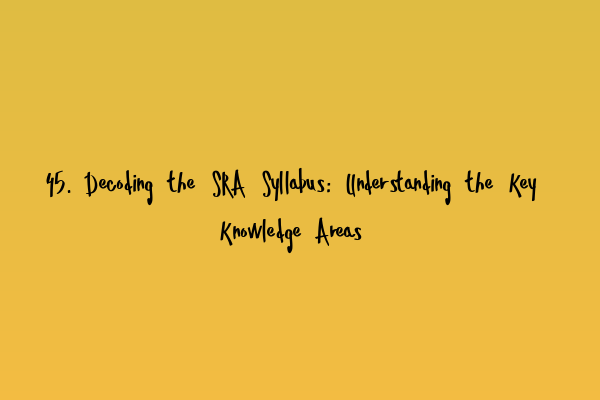Decoding the SRA Syllabus: Understanding the Key Knowledge Areas
Preparing for the Solicitors Qualifying Examination (SQE) requires a thorough understanding of the SRA syllabus. The SRA (Solicitors Regulation Authority) has outlined the key knowledge areas that aspiring solicitors must be proficient in. In this article, we will decode the SRA syllabus and delve into the key knowledge areas that you need to focus on to succeed in the SQE.
The SQE and the SRA Syllabus
The Solicitors Qualifying Examination (SQE) is a new assessment framework introduced by the SRA. It aims to ensure that all solicitors meet the required standards before they can be admitted to the profession. The SQE replaces the previous route to qualification, which involved completing the Legal Practice Course (LPC).
To pass the SQE, candidates must demonstrate their knowledge and skills in various areas of law and legal practice. The SRA has identified a set of key knowledge areas that all candidates must be proficient in. Understanding these knowledge areas is crucial for success in the SQE.
The Key Knowledge Areas
The SRA syllabus outlines 45 key knowledge areas that span across various legal subjects. These knowledge areas can be broadly categorized into six main groups:
- Laws and the Legal System
- Dispute Resolution
- Contracts and Commercial Law
- Property Law and Practice
- Wills, Trusts, and Probate
- Professional Conduct and Ethics
Let’s take a closer look at each of these groups and what they entail:
1. Laws and the Legal System
This group covers fundamental legal principles, sources of law, and the structure and operation of the legal system. It includes topics such as constitutional law, administrative law, criminal law, and human rights law. Understanding the laws and the legal system is essential for any aspiring solicitor.
2. Dispute Resolution
Dispute resolution is a crucial aspect of legal practice. This group focuses on civil litigation, criminal litigation, and alternative dispute resolution methods such as mediation and arbitration. Knowledge of the different dispute resolution processes and the ability to analyze and apply legal principles in the context of disputes is important for solicitors.
3. Contracts and Commercial Law
Contracts and commercial law are at the core of most solicitors’ work. This group covers topics such as contract formation, terms and conditions, sale of goods, intellectual property, and international trade. Understanding the legal framework governing contracts and commercial transactions is vital for solicitors advising clients in various sectors.
4. Property Law and Practice
Property law and practice encompass the legal aspects of owning, buying, selling, and leasing property. This group covers topics such as land law, landlord and tenant law, conveyancing, and property disputes. Knowledge of property law and practice is essential for solicitors dealing with real estate matters.
5. Wills, Trusts, and Probate
Wills, trusts, and probate involve the legal aspects of estate planning and administration. This group covers topics such as will drafting, trusts formation, inheritance tax, and estate administration. Understanding these areas of law is crucial for solicitors advising clients on wealth management and inheritance matters.
6. Professional Conduct and Ethics
Professional conduct and ethics are integral to the legal profession. This group focuses on the SRA Code of Conduct, legal professional privilege, client care, and conflict of interest. Solicitors must adhere to high ethical standards, and a solid understanding of professional conduct is essential for the SQE.
These six main groups encompass the key knowledge areas identified by the SRA syllabus. It is essential to study and understand these areas thoroughly in order to succeed in the SQE.
Preparing for the SQE
As the SQE is a comprehensive examination, proper preparation is essential. The key to success lies in developing a study plan that covers all the key knowledge areas. Here are some tips to help you prepare effectively for the SQE:
- Attend SQE webinars for expert insights – 24. Unlocking Knowledge with SQE Webinars: Expert Insights at Your Fingertips
- Utilize study tricks and tips for SQE success – 31. Conquer the SQE: Insider Tips and Study Tricks for Success
- Understand the grading system in the SQE – Grading System in SQE: Understanding How Exams are Evaluated
- Manage your time effectively for efficient study planning – Time Management for SQE: Strategies for Efficient Study Planning
- Practice role play assessments to sharpen your practical skills – Role Play Assessments in SQE: Tips for Nailing the Practical Skills
By incorporating these strategies into your study plan, you will be well-equipped to tackle the SQE and demonstrate your knowledge and skills effectively.
Conclusion
Understanding the key knowledge areas outlined in the SRA syllabus is crucial for success in the SQE. By focusing on the six main groups and thoroughly studying each area, you can prepare yourself effectively for the examination. Remember to utilize resources such as webinars, study tricks, time management strategies, and role play assessments to enhance your preparation. With dedication, strategic planning, and a deep understanding of the SRA syllabus, you can decode the SQE and embark on a successful career as a solicitor.
